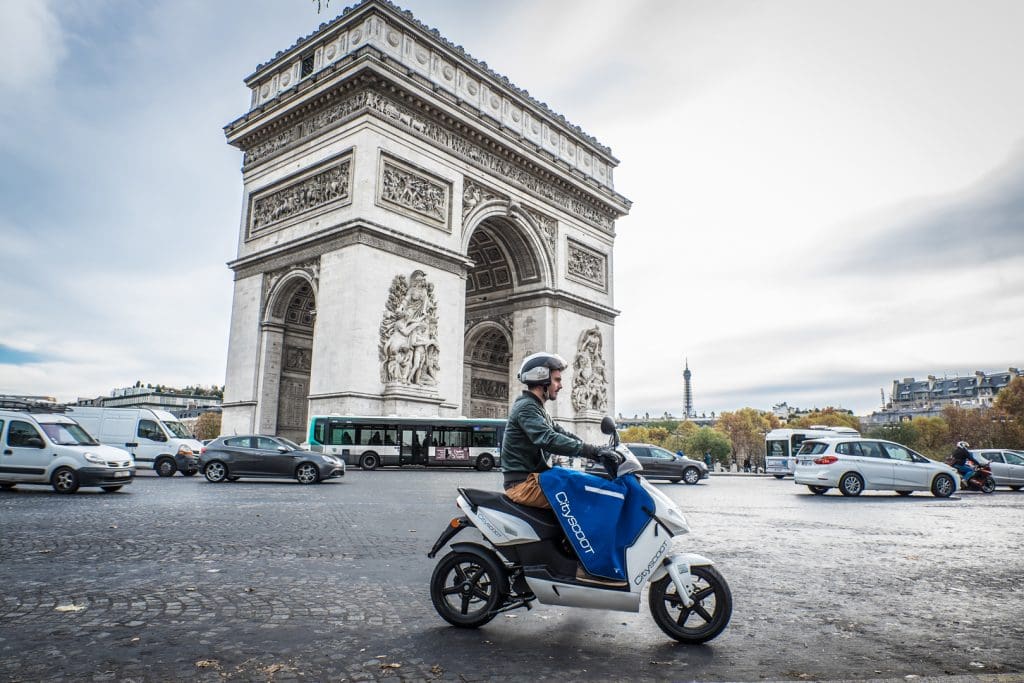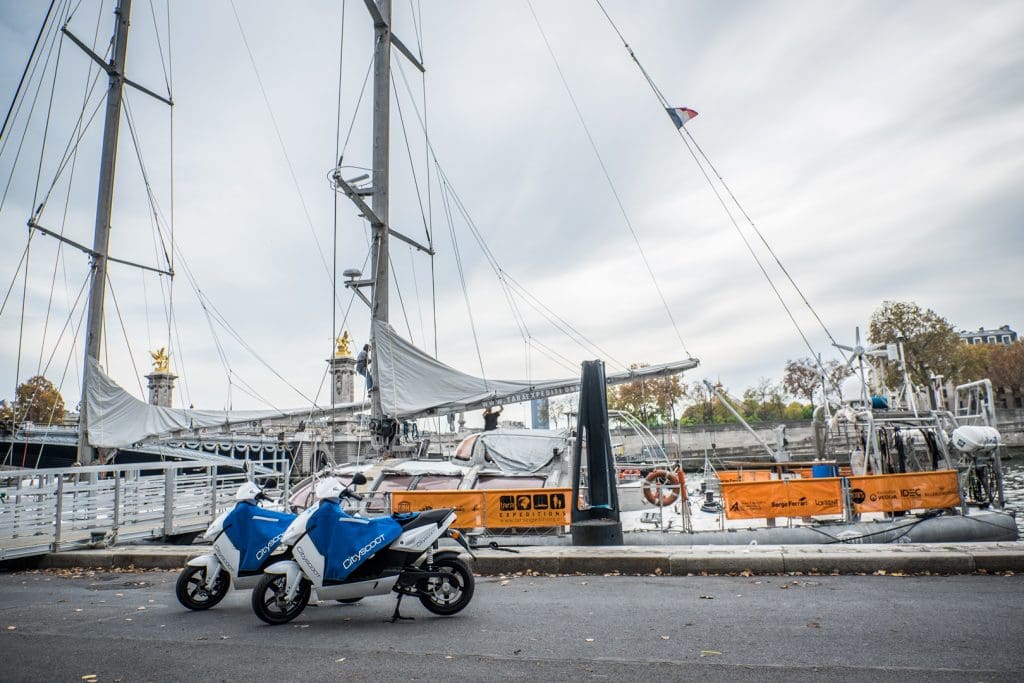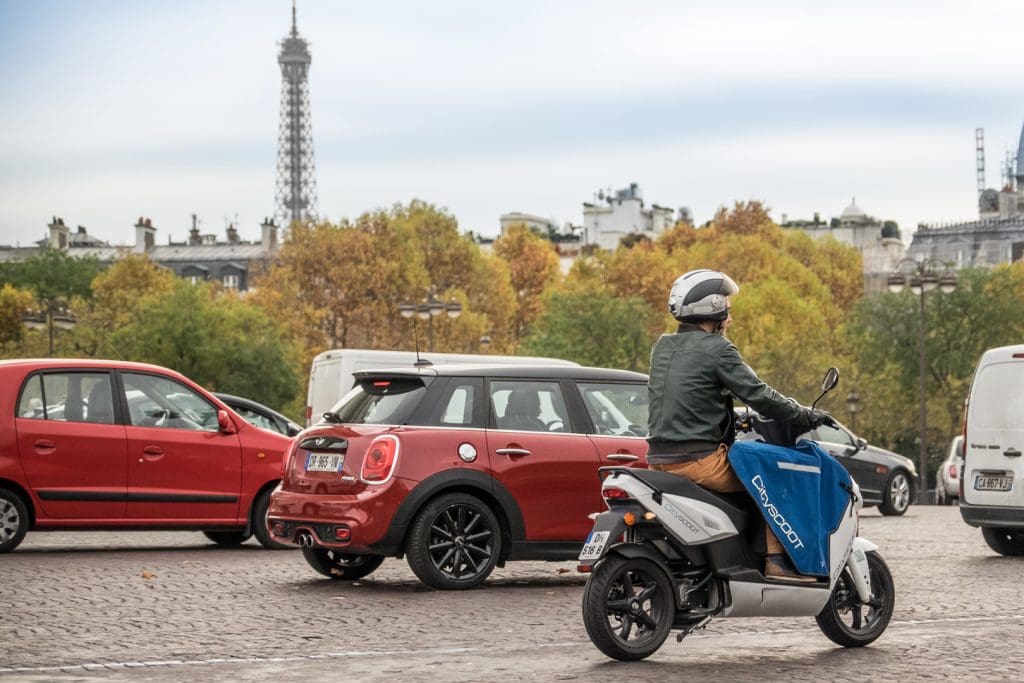Imagine a world where you can log into a mobile phone application to find the nearest electric hire bike parked on the street. There’d also be a helmet under the seat, so you wouldn’t need to lug your own brain bucket around.
You won’t need keys as you simply punch in a four-digit access code on a small keyboard – located under the hinged two-person seat. And best of all you can leave the bike absolutely wherever you want. The phone app will let the next user know where it was last parked.
And dig this. If you’re aged over 27 you don’t even need a licence – of any kind – to blast around on one. If you’re under that age you’ll need a car licence.
It almost sounds to be too good to be true – but the French city of Paris is adopting such a bike-sharing system in a few months to cut congestion and pollution, as well as giving tourists a fun and practical way to explore the main sights… or tear along the banks of the Seine, replicating the chase scene from The Bourne Identity.
Organisers say the CityScoot project may soon spread further afield to London – and even Australia.
The 100kg machine’s 3kWh output is comparable to a 50cc scooter. It packs a top speed of 45km/h and has a range of about 100km, which is more than enough for short trips around a traffic-congested city.
The funky scooters, made by a German company called Govecs, will also be available for sale to the public for about €5000 ($AUD7500) next year.
The scooters will cost €3 ($4.50) for every 15 minutes and, for regular users, an annual subscription will get you 25 percent off for every two hours used.
“The bike accelerates very smoothly and every time you hop on one you just can’t stop smiling,” chief executive of CityScoot Bertrand Fleurose told AMCN. “You also feel proud to be riding something so eco-friendly”.

“Electric is definitely the future. I hope one day all cities around the world, including Australia, will have such a program.”
Bertrand said the three-month trial period has been extremely successful – with each of the 50 bikes in the pilot project being used twice a day for an average of 25 minutes. The target for 2016 is an easily-achievable 30 minutes twice a day – for each of the 1000 bikes.
Pioneering computers at CityScoot’s central office monitor each bike as it’s being ridden through the city – a total area of 105 square kilometres – and will dispatch a staff member to replace the 15kg changeable lithium-ion battery on a parked bike (a five-hour charge would take too long) once the range drops below 40km.
There are LED lights on the handlebar indicating whether the bike is available for hire, or if you’ve exceeded the rather expansive area of permitted usage. To end the rental, all you need to do is park on the road or footpath, turn the handlebar to the left (to lock it), replace the helmet back under the seat (the helmet has an electronic chip, so you can’t nick it) and press a blue button on the ’bar.
In a move that would have our city mayors choking on their corn flakes, the scheme is backed by the mayor of Paris, Anne Hidalgo, who plans to gradually banish all cars from her beloved city of 2.3 million inhabitants. Pollution levels recently hit record levels in the city and as well as ongoing moves to pedestrianise many of the roads running alongside the Seine, buses and trucks made before 2001 will soon be banned from the French capital. The restriction will be extended next year to cars made before 1997.
The mayor of Paris has also promised to create 20,000 parking lots for motorcycles by 2020 – making the city even more bike-friendly.

The scooter’s manufacturer boasts that the bikes use only about 50 cents worth of electricity to cover 100km – less than a quarter of what petrol would cost for a petrol-powered bike over the same distance. The electric bikes are silent, have no emissions, the batteries will last at least 50,000km and the only major service costs are brake pads and tyres.
We wouldn’t be surprised if electric bikes based on this type of social sharing will end up being the future of motorcycling – at least in city centres.
How it works
The phone app displays a map shwoing the scooters available near you and their battery level. Once you’ve registered for the service, you can book a scooter with just three clicks – a process that takes just a few seconds. You can book a bike as little as 15 minutes in advance.
The app uses sat-nav technology to indicate the location of free bikes and their remaining battery life. To unlock the scooter, you punch in a four-digit code (sent via an sms) into a small keyboard.
The open-face helmet, which has a ratchet system (operated via a simple knob to change the size of the inner lining), is stored under the seat. The helmets also come with disposable liners – just like the ones you get at go-kart hire places.
You end the hire via the phone app or by simply clicking a flashing blue button once you’ve parked up and stored the helmet away.
You can only hire one scooter per person. The scooters come with full insurance, with a maximum excess of €500 ($750).
How much?
Signing up to the CityScoot program is free and you get a discount on the rental price by paying €120 ($180) for an annual subscription. Under this scheme, you get 30 minutes free for each two-hour block of rental. It’s €3 ($4.50) for every 15 minutes and cancellation is free within five minutes of the reservation. Cancellation between five and 15 minutes after a booking is €1 ($1.50) and a no-show after 15 minutes is charged at €3 ($4.50) and results in an automatic cancellation of the booking.
By Oscar Kornyei Photography CityScoot
